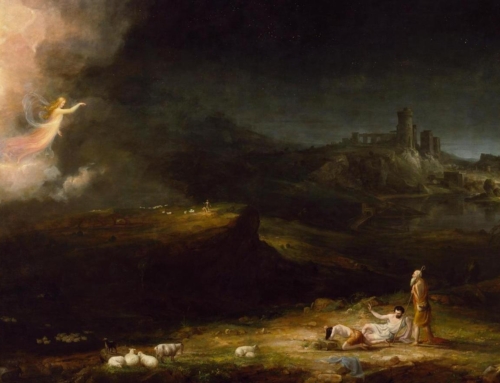The Letter to the Hebrews doesn’t mention Saint Joseph, foster-father of Jesus, but it could have. After exhorting his audience to fidelity, the author gives as examples of this faith a veritable litany of other saints, a “cloud of witnesses” (Heb 12:1). From Abel to Abraham and Sarah, from Moses to David, and down to the last of the prophets, these all “received divine approval” because of their faith in the promises of God (Heb 11:2). But they “did not receive what was promised” (Heb 11:39), since the Messiah would come only after their deaths. These men and women were pilgrims looking only to the everlasting Jerusalem; they are those “of whom the world was not worthy—wandering over deserts and mountains, and in dens and caves of the earth” (Heb 11:38). They are our spiritual fathers and mothers who “suffered for the Christ” who was yet to come (Heb 11:26).
Joseph shared in their anticipatory faith. Since his boyhood, he knew by faith the God of Israel. As “a just man” (Matt 1:19), he would have meditated on the law of his Lord, on Torah and the history of Israel, constantly (Ps 1:2). He saw how God acted in the lives of the first cloud of witnesses. Now, in this Christmas octave, Joseph beholds the promised one himself: the Son of God, come in the flesh. The same God whose provident hand led the Israelites out of Egypt now waits as an infant upon the providence of Joseph. Although he died without seeing the final fulfillment of Jesus’s mission, he, like the saints of the Old Testament, still lived and suffered for the promised Christ. Joseph’s earthly wanderings, wholly consecrated to the incarnate Messiah, reveal faith as the foundation of his life.
In his recent apostolic letter, “With a Father’s Heart,” Pope Francis distinguishes Joseph’s active faith from passive resignation. Joseph could accept, without full explanation, the many trials in the life of the Holy Family. Infused with the Spirit’s fortitude, he could leave off all his plans to serve as the caretaker of the Son of God; to provide for the Virgin Mother and to name the Emmanuel; to abandon everything and escape to Egypt, and again to Galilee (Matt 1:18–24, 2:13–23). He too “suffered for the Christ,” “wandering over deserts and mountains,” awaiting Jesus’s birth in the silence of the Bethlehem cave. All this, as the Pope writes, came from Joseph’s “Christian realism”—the realism of faith. Because Joseph knew the real truth of God, he had a realistic and true perspective on his own situation.
Even in the most difficult of situations—leading his family into and out of exile in Egypt—Joseph knew to trust God. He had heard the promise of God, who said, “Out of Egypt have I called my son” (Matt 2:15, Hos 11:1). Even along those winding desert paths, Joseph could always turn and see Mary holding the Son of God. His assurance in the reality of the long-awaited Christ gave purpose to his steps and endurance in adversity.
Tomorrow, many will no doubt celebrate “the end of 2020”—the end of a year marked by adversity for all, whether more or less grave. Still, it’s naive to think that changing out the wall calendar will heal the physical and spiritual wounds in this world. This is not a realist’s answer to suffering, for we were not made to be nomads forever.
Before we leave this year behind, how can we look back on it with the Christian realism of St. Joseph? Where, in the desert of this past year, can we see the Emmanuel, God-with-us? We, like all the holy ones before Christ, are wayfarers even in the twenty-first century. But now the promise has been fulfilled. The Christ has come. At Joseph’s side, we can “look to Jesus the pioneer and perfecter of our faith” (Heb 12:2). He alone is our hope, the infant King of the eternal Jerusalem.
✠
Photo by Vlad Kiselov on Unsplash







